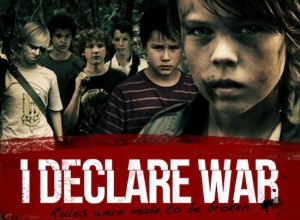Blurring the Battle Lines: I Declare War (2012)

Blurring the Battle Lines:
I Declare War
(2012)
“What are you doing after the war?”
“You’re coming over and we’re eating pizza and watching a movie.”
“What movie?”
“Paton.”
“Again?”
An odd little Canadian film, this. When I first saw the trailer for it I thought that it was going to be some sort of heavy commentary on the cruelty of kids, following along the lines of William Golding’s oft-filmed debut novel Lord of the Flies.
That impression was added to by stills of a young actress called Mackenzie Munro evoking The Hunger Games as she posed in rather disturbingly jail-bait sexy manner with a crossbow.
Having finally seen I Declare War—it was actually first shown in 2012—I think that I’m going to stick with the disturbing aspect; although I don’t doubt that others will see it as a little more light-hearted. And there is certainly a case to be made that, rather than either of the above, it more closely resembles Garth Jennings’s enjoyable Son of Rambow. What the intentions of co-directors Jason Lapeyre (also writer) and Robert Wilson are I’m unsure of.
It concerns a group of pre-teens (although some have certainly crossed that line, I hope) who engage in war games. Gage Munroe is the undefeated P.K who finds a new and determined nemesis in Michael Friend’s Skinner. With both groups having established secret bases the objective is to capture the flag of the other team.
The children ape the language of their elders, particularly the pseudo-tough vernacular of war movies; and one even calls himself Joker, presumably after the character in Kubrick’s Full Metal Jacket.
Each young person is of a particular type, with both sexual politics and racial politics thrown into the mix. Mackenzie Munro’s Jess is particularly adept at using her feminine wiles (although the film is mercifully innocent in this regard); but I found that the inclusion of the Asian characters, presumably as symbolism, maybe a bit top-heavy. Although of course I could just be reading too much into that.
Still, the ‘types’ work pretty well on the whole, with the altar boy getting one of the film’s laugh-out-loud lines:
“I’m an altar boy at St. Andrew’s.”
His companion looks at him thoughtfully. “Ever been buggered?” he asks him.
“Ah, no”, says the kid. “It’s an Anglican Church.”
I have to say that my first reaction when the movie began was shock at how realistic toy weaponry had become since my day. It took a moment for it to penetrate my thick skull that a lot of the action was taking place in the minds of the kids in a deliberate attempt to blur the lines between reality and fantasy. Strangely enough, although this is successful I found it a bit off-putting as well. I had to keep reminding myself that none of it was particularly far removed from what I and others had done as children. (Although a nagging voice at the back of my brain kept reminding me that I didn’t know any of my friends who went on to stage the kind of school massacres that became too common later on.)
The film also comes dangerously close to escalating into real violence at times; but again, if we don’t recall what we were capable of doing at the age of twelve, then I’m sorry to say that we’re giving a right lash of Tom Sawyer’s whitewash to our pasts.
I Declare War is an interesting if ultimately rather insubstantial look at children and their attitudes to violence. Whether or not you’ll take anything more than that from it would, I imagine, depend on your mood at the time.
Then again, doesn’t everything?

Recent Comments